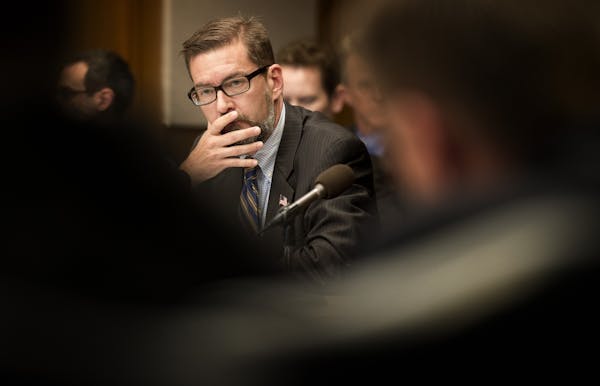The Minnesota Senate narrowly approved a modest increase to the state's minimum wage on Wednesday that directly contrasts with the higher wage hike approved by the House and endorsed by Gov. Mark Dayton.
Voting 39-28 along party lines to raise the minimum to $7.75 an hour, Senate Democrats said they lacked the support to push the minimum wage much higher. No Republicans voted for the increase.
Dayton said on Wednesday that he would support the Senate proposal if it were his only option because, "something is better than nothing." But, he said, "I'd be very disappointed. I want work to pay. That means that somebody working full time needs to make enough money to bring a family of four, say, up to the poverty level."
The Senate's proposal would give lower wage workers a 50-cent jump in pay over the current $7.25 per hour federal minimum by 2015. The House voted last week to hike the minimum to $9.50 an hour, when fully phased in two years from now. Dayton said he greatly prefers the House level. Minnesota now has one of the nation's lowest minimum wages, with smaller businesses allowed to pay well below the federal minimum.
The gap between the minimum wage proposals adds another dispute for the Capitol Democrats to settle before the legislative session's end in 12 days. Although they all support some hike in the minimum wage, meaning the wage floor will likely rise, they have starkly different positions on how it should be done.
Many Senate Democrats on Wednesday mentioned the modesty of the increase they were backing but said the lowest wage earners would still benefit.
"If they can get even a little bump, it will still help them somewhat and this truly is a little bump," said Sen. Barb Goodwin, DFL-Columbia Heights. "It's not going to make a big difference in the life or the death of a business or the life or death of an individual, but it sure is going to make a little difference on how much food they have on the table."
About 93,000 Minnesotans now earn at or below the federal minimum wage of $7.25. If the minimum wage rose to $9.50 an hour, about 350,000 Minnesotans would see an increase. At $7.75 an hour, bill sponsor Sen. Chris Eaton, DFL-Brooklyn Center, said about 200,000 people would get a wage bump.
Minnesota law currently dictates a $6.15 minimum per hour for large employers but because it is one of the few states with a state minimum below the federal standard, most businesses are required to pay at least $7.25 an hour.
The House version not only would increase the minimum hourly rate, it would tie future increases to the cost of living and make them automatic. It also would require employers to offer 12 weeks of family leave and make overtime after 40 hours of work mandatory. Currently, some employers are exempt from those standards. The Senate version does not include any of those provisions.
Unions, among Democrats' key backers and strong supporters of a minimum wage hike, have urged the Senate to reconsider their rate.
"The Senate bill unfortunately falls short," said Minnesota AFL-CIO President Shar Knutson. Union backers have been contacting lawmakers to assure them that hiking the minimum wage is not only the right, but the politically palatable thing to do.
A Star Tribune poll this year found that a vast majority of Minnesotans support raising the minimum wage. Although outstate Minnesotans and female voters were most supportive, support for a wage hike cut across all demographics, according to the March poll.
But Minnesotans, like lawmakers, were divided on how much of a raise low-income workers should receive. In the poll, 41 percent supported a hike to $9.50 an hour, while 28 percent approved of $7.50 an hour.
On Wednesday, Republican lawmakers said that any hike in the minimum wage would end up hurting the very people who are the intended beneficiaries.
"This is a poverty bill," said Sen. Roger Chamberlain, R-Lino Lakes. "It's another bill of false hope and false promises."
He argued that small businesses would have to lay off workers or not hire workers if they were forced to pay employees more. Both those for and against the wage hike have studies on their sides to back up their claims.
Sen. John Pederson, R-St. Cloud, said a higher minimum wage would give an advantage to big businesses that can afford to pay more and hurt smaller businesses. "Raising minimum wage, members, is about reducing competition," Pederson said.
In the coming days, Democratic lawmakers are expected to negotiate a compromise minimum wage measure they can pass for the governor to sign.
Rachel E. Stassen-Berger Twitter: @rachelsb
